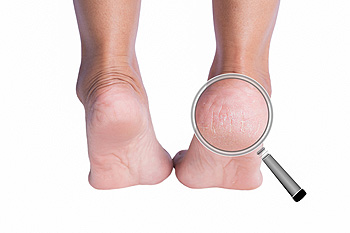Heel fissures (cracked heels) that deepen may not only be unattractive, but painful. Left untreated, they may form hardened calluses, bleed, or even become infected. Cracked heels are usually the result of dry skin. Sometimes, this is exacerbated by obesity—which can cause dry skin to stiffen and crack when it is overly stretched. Standing on hard flooring for prolonged periods, as well as wearing poorly fitting or open-back shoes, or having certain foot disorders, psoriasis, eczema, and other medical conditions may also contribute to the development of cracked heels. You can help prevent heel fissures from occurring by keeping your feet hydrated with emollient or humectant moisturizers, limiting your time in the shower or bath, and opting for warm, rather than hot, water. Severely cracked or bleeding heels should be cared for by a podiatrist who can help prevent them from becoming infected.
Cracked heels are unsightly and can cause further damage to your shoes and feet. If you have any concerns, contact Dr. Mark Gagnon from Advanced Podiatry. Our doctor can provide the care you need to keep you pain-free and on your feet.
Cracked Heels
Cracked heels appear unappealing and can make it harder for you walk around in sandals. Aside from looking unpleasant, cracked heels can also tear stockings, socks, and wear out your shoes. There are several methods to help restore a cracked heel and prevent further damage.
How Do You Get Them?
Dry skin is the number one culprit in creating cracked heels. Many athletes, walkers, joggers, and even swimmers suffer from cracked heels. Age and skin oil production play a role to getting cracked heels as well.
Promote Healing
Over the counter medicines can help, especially for those that need instant relief or who suffer from chronic dry feet.
Wear Socks – Wearing socks with medicated creams helps lock in moisture.
Moisturizers – Applying both day and night will help alleviate dryness which causes cracking.
Pumice Stones – These exfoliate and remove dead skin, which allows for smoother moisturizer application and better absorption into the skin.
Change in Diet
Eating healthy with a well-balanced diet will give the skin a fresh and radiant look. Your body responds to the kinds of food you ingest. Omega-3 fatty acids and zinc supplements can also revitalize skin tissue.
Most importantly, seek professional help if unsure how to proceed in treating cracked heels. A podiatrist will help you with any questions or information needed.
If you have any questions, please feel free to contact one of our offices located in Crestwood, Orland Park, and Summit, IL . We offer the newest diagnostic and treatment technologies for all your foot care needs.

